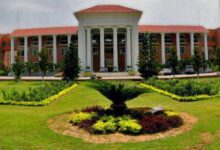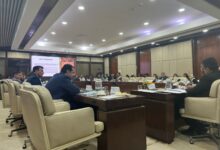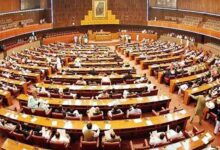Government to import 6 lac Environment Friendly Electric Vehicles as Medium Target
Islamabad: -The federal government has planned to import six lac and two thousand Electric Vehicles as a medium target for introducing environment friendly transport in the country, The Reporters has learnt.
According to the official documents available with The Reporters, 100, 000 cars (including Vans, Jeeps and small trucks), 500,000 Two and Three Wheelers, Four wheelers of UNICE ‘L’ category, 1,000 Buses and 1,000 Truck will be imported as a medium target.
It said that different type of incentives have been given for making EVs locally. For cars, all EVs manufactured locally shall be sold at 1% GST for Fists seven years. EVs shall be exempted from vehicle registration fee and annual token tax, All EV specific parts shall be allowed import at 1% custom duty for next two years. For the first two years, up to 3 years old “Used” all –EVs shall be allowed to import for transfer of technology (TOT) as the local manufacturing industry gets mature.
It is mentioned in the documents that the government shall purchase 1,000 all electric buses and will ask commercial operators to operate them for a concessionary period, given that they establish the requisite charging infrastructure. The first 200 electric buses shall be imported at less than 1% custom duty and be sold at 1% GST with the agreement that other 800 buses shall be manufactured in Pakistan. Metro buses and BRT routs in Lahore, Islambad/Rawalpindi, Multan and Peshawar shall be prioritized for electrification of buses, it added.
The existing automakers may use their already established location for covering to EV assembly/manufacturing facility under Greenfield investment regulation of prevailing Auto Development Policy 2016-21.The State Bank may allow lower financing rates for EV manufacturing plants to setup under Long Term Financing Facility (LTFF) to encourage Prospective EV manufacturers towards export, the documents said.
About the charging Infrastructure, it has been suggested in the documents that for the first two years all level-2,level-3 and any other charges beyond level-3 shall be imported at 1% custom duty and 1% GST. Same custom duty GST incentives will also apply to their components. All entities offering public level-2 charging shall be allowed to show the installation cost of the charging facility as Corporate Social Responsibility (CSR) Contribution.
It further said that other new technologies of charging like super capacitor, stationary and on-road wireless charging and other upcoming technologies shall be allowed at 1% custom duty and 1% GST for the first 5 years.
It also mentioned in the documents that charging infrastructure shall be installed at different points in all major cities. In each major city at least one DC fast charging station shall be installed in every 3×3 km area. DC fast chargers shall be installed along major motorways and highways after every 25-50 km on both sides of each of the road. Pilot charging infrastructure shall be carried out in Lahore due to smog issues. DSICOS shall be responsible to identify the feeders load from DC fast chargers can be managed.
Existing CNG and Fuel stations are encouraged to take a leading role in established of charging infrastructure. In this regard Oil Marketing Companies (OMC’s) are encouraged to take a leading role in the development of charging infrastructure for EVs, the official documents said.
Earlier on direction of Prime Minister’s Committee on Climate change, the Ministry of Climate Change undertook a number of consultative sessions with the relevant stakeholders (including FBR, Petroleum Division, Oil refineries/OMCs,and EDB M/o Industries) to formulate the National Electric Policy. The Electric Vehicle Policy was submitted to Cabinet after intensive consultations with relevant stakeholders. Cabinet has approved National Electric Vehicle Policy in its meeting of 5th November,2019.






